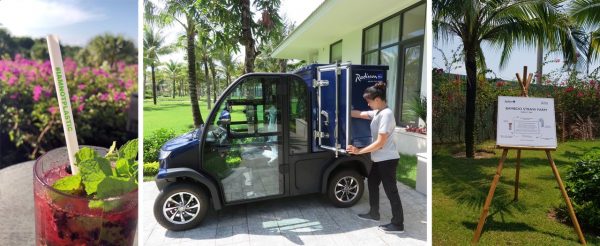SINGAPORE, 1 July 2019: Radisson Hotel Group claims it has a strong responsible business ethos and meaningful action is being taken to preserve the environment giving back to local communities.
Is it a greenwash or the genuine item at destinations where it flies the Radisson flag in Bali, the Maldives and two emerging Vietnamese beach resorts, Phu Quoc and Cam Ranh.
Radisson Blu Bali Uluwatu, opened in February 2018 said it has introduced environmental activities to counter Bali’s growing mountain of plastic pollution. Straws are made out of cornstarch material, plus bags, slippers and bathroom amenities are no longer plastic.

Plastic bottles have been replaced by glass containers in a move that turns the clock back to when plastic was considered cheap and nasty and was never displayed on a dining table in a five-star hotel.
Radisson Blu Resort Phu Quoc, launched in July 2018, produces its own bamboo straws, and guests can visit the onsite bamboo farm and learn how the straws are made.
The resort has also formed partnerships with local farms to produce organic honey, peppercorns and other ingredients for the hotel’s restaurants, but is it really organic on an island where pesticides penetrate the agricultural water supply?
Radisson Blu Resort Maldives due to open in the first quarter of 2020, is pumping up its message plastic-free products by using bamboo or metal straws, reusable cloth laundry bags and glass bottles throughout the resort. A glass-crushing machine will also be installed, which allows glass waste to be pulverized in-house, packed and shipped for recycling. But what happens to food waste and how environmentally friendly is the electricity supply?
Radisson Blu Resort Cam Ranh, now in the construction pipeline and due to open in the second quarter of 2020 has an agenda to “fight single-use plastics, with cups, straws and bottles all being replaced with reusable options. Bamboo and glass straws will be adopted, and the resort will operate a bottling facility for both still and sparkling water. The resort will also work towards employing a food waste reduction programme.
Energy saving solutions including LED lights and motion sensors are usually installed in new Radisson Blu resorts.
The most effective way to reduce energy use, however, is through intelligent design and architecture, and many of Radisson Blu resorts in Asia are now being designed in such a way that allows fresh air and light to flow through the property.
“Tourism continues to soar in many Asian destinations, but this prosperity puts pressure on the environment, especially in pristine coastal regions,” said Radisson Hotel Group vice president, operations, Southeast Asia and Pacific, Andre de Jong. “Therefore, it is essential that major tourism and hospitality operators take proactive measures to preserve the local ecosystem.”






